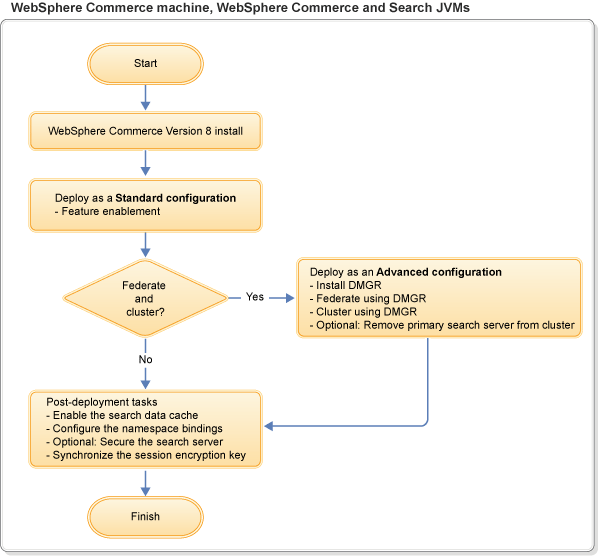- Deploying the WebSphere Commerce Search server locally in the standard configuration
You can deploy the search server on your WebSphere Commerce server by running the deploySearch scripts. This script creates and deploys a separate search profile and web module on the same machine as the WebSphere Commerce profile.
- Federating and clustering the WebSphere Commerce Search server in the advanced configuration
Once you deploy the WebSphere Commerce Search server in the standard configuration, you can federate the node to the deployment manager (DMGR) and create a cluster that contains the WebSphere Commerce and WebSphere Commerce Search servers.
- Configuring the WebSphere Commerce and WebSphere Commerce Search server namespace bindings
After you deploy WebSphere Commerce Search, you must configure the namespace bindings to ensure that search requests are handled correctly. The WebSphere Commerce and WebSphere Commerce search servers use namespace bindings that are defined in the WebSphere Application Server administrative console. Instead of defining the server URL in the wc-search.xml file, you can specify a reference to the search URL name binding.
- Removing the primary WebSphere Commerce Search server from the cluster
After you federate and cluster the WebSphere Commerce Search server in the advanced configuration, you can optionally remove the primary search server from the cluster. However, it is recommended that you keep the primary search server in the cluster, and then shut it down. When it is shut down, the node agent still exists, and the cluster is partially started. The DMGR is then able to perform maintenance as needed.
- Enabling the WebSphere Commerce Search data cache
The search server data cache uses DistributedMap object caches, which are defined automatically during feature pack installation.
- Securing the WebSphere Commerce Search server
It is recommended that you secure WebSphere Commerce Search by enabling WebSphere Application Server Administrative Security. You can further secure your search server by optionally enabling WebSphere Application Server Application Security. Enabling Application Security results in securing Solr Administrative services so that only authenticated users can run these services. For example, updating, deleting, and building a search index. However, performance degradation might be associated with enabling Application Security.
- Synchronizing the session encryption key with WebSphere Commerce Search
If you are using local authentication on the WebSphere Commerce Search server, ensure that the session key is synchronized between WebSphere Commerce and WebSphere Commerce Search. Complete this task every time you change the encryption key on the WebSphere Commerce server.

